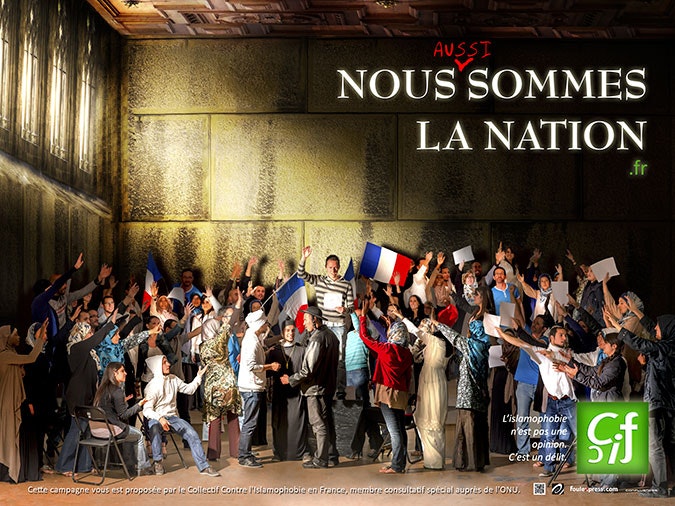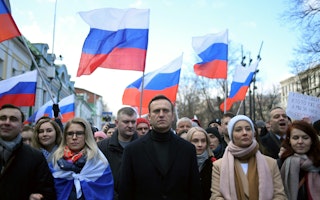It’s Not Just a “Muslim” Thing
By Hélène Irving & Marwan Muhammad

Muslims are “threatening,” “backwards”—“submissive” in the case of women and “oppressive” in the case of men—“outsiders” who follow a religion “fundamentally incompatible with the French Republic and western values” and who therefore “don’t belong in France.” These are just some of the mainstream clichés and stereotypes regarding Islam and Muslims in France that a new campaign by the Collective Against Islamophobia in France (Collectif Contre l’Islamophobie en France, CCIF) aims to deconstruct. “Nous aussi sommes la nation” or “We too are the Nation” aims to promote a better understanding of French Muslims. The message is simple: Muslim citizens are citizens of France who share the same values, dreams, and history as other French citizens. In this interview, Helene Irving asked Marwan Muhammad, spokesperson for CCIF to talk to us about some of the images and messages of the campaign.
Can you describe the flagship image for the campaign?
The flagship image for the campaign is a re-imagining of a famous French painting depicting a pivotal moment in the French Revolution, the Tennis Court Oath. The citizens you can see in this version give an idea of the ethnic and religious diversity of France today. The point being made here is that French Muslims are French citizens, legally, socially and economically. They are a part of France and have a say in what defines the country. The same is true for all ethnic and religious minorities. France’s religious groups—Jews, Muslims, Sikhs, or Christians—do not need to abandon aspects of their religious identity in order to “become French.” The image represents a vision of France built on unconditional respect where all citizens of France share the same common project of living together.
The other major image of the campaign shows a real life French family. So often, in the French context, the words “Muslim” and “Arab” are seen as synonymous with one another. But Muslim does not equal foreigner. This family is not “foreign” or of a “minority background” but French. They are a real family, however hard some of our detractors found it to believe. The picture also aims to break clichés about Muslim family life. The family we see here are happy and, more importantly, normal.
What has been the impact of the campaign so far?
The campaign has been hugely successful. We have had a large amount of media coverage, with national television channels, radio stations, and all the major newspapers giving attention to the campaign. Most of the coverage has been positive. The number of calls that we receive from victims of Islamophobia—the helpline is a big part of CCIF’s work—has increased since the launch of the campaign as awareness is raised amongst the Muslim communities as to what their rights and responsibilities are with regards to reporting discrimination.
Have you seen any change in the way that these issues are discussed in France?
One of the great things about the campaign is that, for the first time ever in France, Islamophobia is being openly discussed. Just this last week, two TV shows were aired which were dedicated to the issue of Islamophobia. That wouldn’t have happened before. There is evidence that the debate is evolving. Two weeks ago, if you spoke up about Islamophobia you would be associated with Iran or Islamism or other such clichés. Whilst the traditional bias is still there, we are now seeing it increasingly approached from a more academic and rational standpoint.
As we spoke to Marwan it was clear that there are aspects of the French context which are very real in other Western European countries. The clichés that CCIF are trying to deconstruct in France are by no means exclusive to France and French society. Most readers from other countries in Europe, or even the U.S., will recognize the majority if not all of the stereotypes from their own national context. Islamophobia, this new form of cultural racism which is just as much about ethnicity as it is religion, is a phenomenon intensifying across Europe as the debate about identity continues to be exploited by populist parties and movements. France is not the only country that struggles with the reconciliation of difference in its concept of “national identity” or its vision of living together.
The CCIF campaign aims for “open dialogue.” Open dialogue means that the issues faced by Muslims can no longer be seen as just their “problem” but have to be seen as everyone’s problem. Open dialogue means having to deal with challenge, opposition, or difference rationally and with respect; it is better than no dialogue at all. Open dialogue—including the voices of the most marginalized and stigmatized in society—is indispensable in creating a new narrative for a fairer and more open society.
Until October 2014, Hélène Irving was a program coordinator for the Open Society At Home in Europe project.
Marwan Muhammad is spokesperson for Collective Against Islamophobia in France (Collectif contre l’Islamophobie en France, CCIF)


